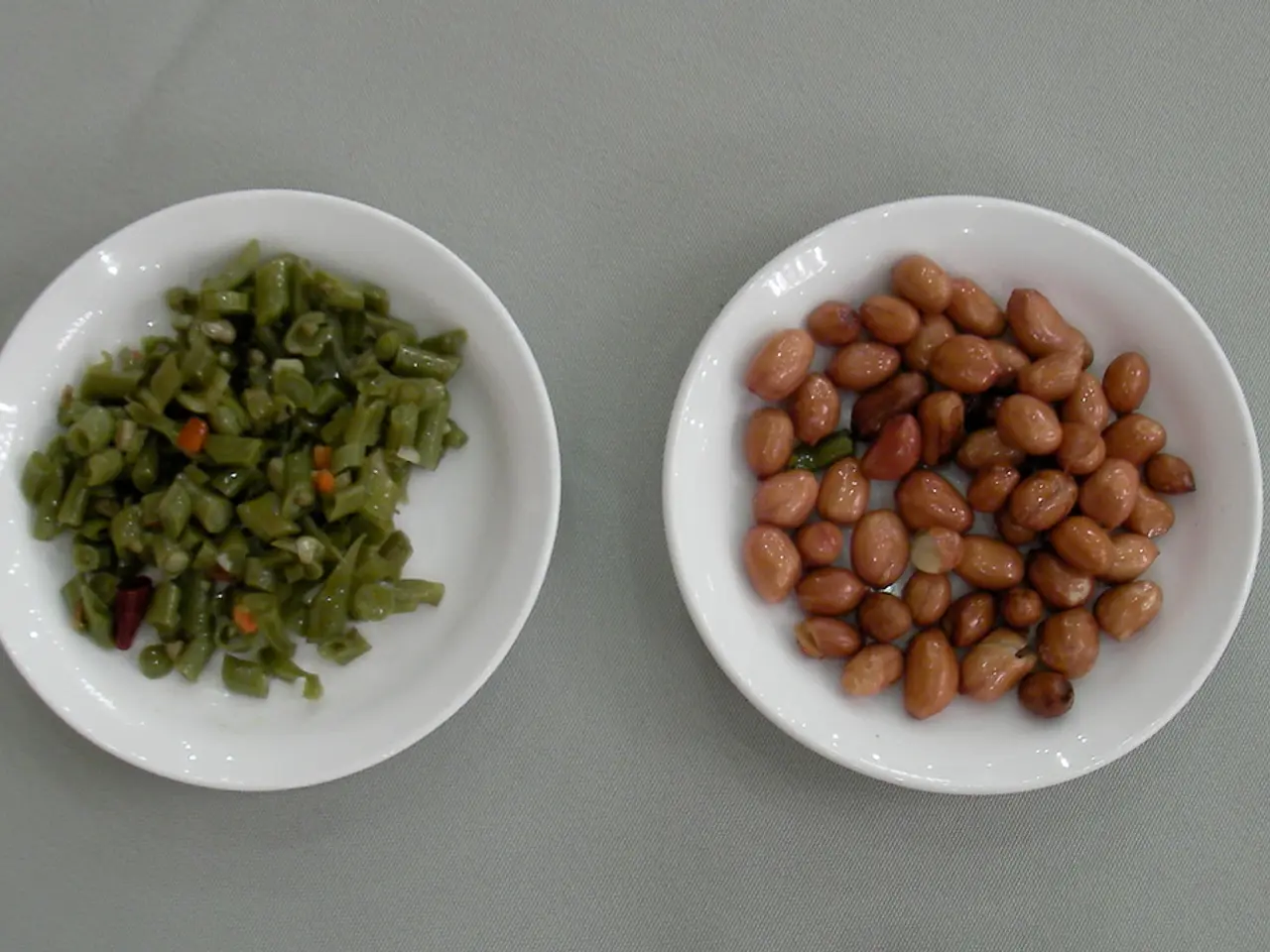Peanuts and cholesterol: A nutritional evaluation
Peanuts, a popular snack and staple ingredient, are not just tasty but also packed with nutrients that contribute to a healthier heart. The American Heart Association recommends including peanuts in a balanced diet, as they can help lower LDL (bad) cholesterol and raise HDL (good) cholesterol levels[1].
Peanuts and peanut products such as peanut butter contain monounsaturated and polyunsaturated fats, which have been shown to reduce LDL cholesterol and increase HDL cholesterol levels[1][3][4]. These healthy fats help improve overall cholesterol balance and support heart health.
The presence of antioxidants, arginine, magnesium, and potassium in peanuts further supports cardiovascular health by improving blood vessel function and blood pressure[4]. Replacing saturated fats with the unsaturated fats found in peanuts leads to beneficial effects on blood cholesterol profiles, lowering risks associated with cardiovascular diseases[5].
However, it is important to consume peanuts in moderation because excessive intake may lead to weight gain or an omega-6 fatty acid imbalance, which could attenuate benefits[4]. A daily serving of peanuts consists of a small handful of peanuts or 2 tbsp of peanut butter.
Regular consumption of peanuts is linked to a healthier cholesterol profile, characterized by lower LDL and higher HDL levels, contributing to improved heart health[1][3][4][5]. Achieving and maintaining a moderate weight may also help improve cholesterol levels.
In addition to peanuts, increasing physical activity, particularly aerobic and resistance exercise, and aiming for 30-60 minutes per day may help improve cholesterol levels. Limiting intake of saturated fats found in meat, dairy, and tropical oils, as well as increasing soluble fiber intake, may also help improve cholesterol levels.
Eating plant sterols, compounds that occur naturally in plant foods, may help lower LDL cholesterol. Quitting smoking and avoiding secondhand smoke, limiting alcohol intake, and learning about lowering cholesterol naturally without medication may also help improve cholesterol levels.
It is essential to note that while peanuts can contribute to a heart-healthy diet, they should be consumed as part of a balanced, healthful diet. Individuals with high cholesterol may benefit from eating peanuts, but taking cholesterol-lowering medications such as statins to reduce the risk of cardiovascular disease may be necessary.
Sources:
[1] American Heart Association. (2021). Healthy diet: What you eat matters. Retrieved from https://www.heart.org/en/healthy-living/healthy-eating/eat-smart/nutrition-basics/a-ha-diet-eating-plan
[2] Mayo Clinic. (2021). Cholesterol: What is it and why does it matter? Retrieved from https://www.mayoclinic.org/diseases-conditions/high-blood-cholesterol/in-depth/cholesterol/art-20046103
[3] WebMD. (2021). Peanuts: Nutrition facts and health benefits. Retrieved from https://www.webmd.com/diet/peanuts-nutrition-facts-health-benefits
[4] Harvard T.H. Chan School of Public Health. (2021). Peanuts and heart health. Retrieved from https://www.hsph.harvard.edu/nutritionsource/food-features/peanuts/
[5] Cleveland Clinic. (2021). How to lower your LDL cholesterol levels. Retrieved from https://my.clevelandclinic.org/health/articles/17113-how-to-lower-your-ldl-cholesterol-levels
- A moderate consumption of peanuts, rich in monounsaturated and polyunsaturated fats, can help reduce LDL cholesterol and increase HDL cholesterol levels, supporting heart health, as suggested by scientific studies [1][3][4].
- Besides peanuts, managing chronic conditions like asthma, psoriatic arthritis, macular degeneration, ulcerative colitis, HIV, diabetes, and multiple sclerosis requires a holistic approach involving medical-conditions care, chronic-diseases management, health-and-wellness measures, and fitness-and-exercise.
- Including peanuts in a balanced diet can contribute to improving overall nutrition, providing essential antioxidants, arginine, magnesium, and potassium, which enhance blood vessel function and blood pressure, further supporting cardiovascular health [4].
- Dietary adjustments, such as replacing saturated fats with unsaturated fats found in peanuts and other healthful sources, can lead to favorable effects on blood cholesterol profiles, lowering cardiovascular disease risks [5].
- Maintaining a healthy weight through nutrition, fitness-and-exercise, and managing obesity is crucial for optimal cardiovascular health, as it may help improve overall cholesterol levels.
- Regular exercise, particularly aerobic and resistance training, and a focus on fitness-and-exercise routines for at least 30-60 minutes daily can contribute to improved heart health beyond the benefits of peanuts alone.
- Limiting intake of saturated fats found in meat, dairy, and tropical oils, as well as increasing soluble fiber intake may help improve cholesterol levels indirectly, offering additional support for heart health.
- Plant sterols, naturally occurring compounds in plant foods, may help lower LDL cholesterol levels, aiding overall cardiovascular health.
- Addressing modifiable risk factors such as quitting smoking, avoiding secondhand smoke, limiting alcohol intake, and practicing stress management may help lower cholesterol levels and contribute to heart health.
- For individuals with psoriatic arthritis, managing their condition through consultations with medical professionals, effective medication use, and making dietary adjustments like incorporating peanuts can help combat associated inflammation and maintain overall health.
- Achieving health-and-wellness for those managing multiple chronic conditions, including cardiovascular diseases, diabetes, and various autoimmune disorders like psoriatic arthritis, psoriasis, and colitis, requires a comprehensive approach that includes proper nutrition, medical-conditions care, fitness-and-exercise, and stress management for long-term success.




